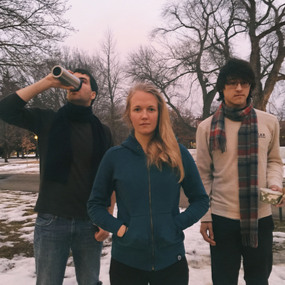All those kindergarten lessons about learning to share have paid off for Marielle Foster ’16, Matt Cotter ’15 and Ken Schiller ’15.
Their ability to politely huddle around a single computer—coupled with an affinity for algorithms—earned them a trip to Morocco.
The Carleton trio snagged a spot in the prestigious International Collegiate Programming Contest’s World Finals upon placing fourth out of 273 teams in a November regional competition. They’ll be one of 25 collegiate qualifiers from North America in the May tournament, and the first from Carleton to advance since 1997.
Several heavy hitters comprise the stateside honor roll, among them, Massachusetts Institute of Technology, Harvard, Princeton, Stanford and the University of Chicago. The opportunity to compete against large, prominent universities—along with 92 international teams, including past world champions from China and Russia—isn’t lost on Cotter.
“We know that Carleton is awesome. The people here know that we have a really good computer science program and great students. I don’t know if tech companies and top level industry places know that so much,” he says.
“So anytime we can put Carleton’s name out there … I mean just the fact that we qualified for Worlds alone is probably cool, but if we do well there, that would be incredible.”
Outside of Messiah College in Pennsylvania (enrollment 2,800), Carleton is by far the smallest U.S. school in the mix. The distinction might explain why all three students are approaching their Morocco achievement with considerable calm. They know they’ll be viewed as underdogs, a “wild card,” as Foster put it.
Dave Musicant, a Carleton computer science professor and the team’s faculty advisor, doesn’t believe the room will intimidate his crew.
“First and foremost, they’re smart. And they’re good. It’s a bit of a wacky contest … but for the most part, it doesn’t require a very detailed, esoteric knowledge that someone who has taken a boatload of classes might know,” Musicant says.
Advancing to Morocco
In order to qualify for Worlds, teams had to impress at regionals, a set of smaller tournaments that pit colleges in close geographical proximity against each other at several satellite sites. The North Central region featured eight Midwest states, including Minnesota, and two Canadian provinces.
Standard rules: Three-person teams received five hours to work collaboratively on nine complex programming “tasks,” the goal being successful completion of as many in the time allotted. Participants also had to share a single computer and could only use a pencil and paper as outside resources.
“I think there was a little bit of strategy around balancing the resource we had, which was the one computer,” Schiller says. “You had to know when to give up trying to debug (a problem) on the computer and let someone else step in and find a solution.”
“You’re not submitting an answer to the problem. You’re submitting code that provides input that can provide answers,” Foster adds. “A lot of people are convinced that this is a hack-a-thon, but it’s not. It’s a programming contest with mathematical problems, or coming up with the algorithm that would solve them.”
Looking ahead to Morocco, team chemistry could very well be the secret weapon.
Cotter, of Morris, Minn., and Schiller, a Portland native, have been roommates since freshman year. Both are coding “hobbyists,” and together, they transformed the waning Carleton Computing Society into the more vibrant Developers Exchange (DevX).
Foster, of Minneapolis, and Cotter also work closely as CSA Senate vice president and treasurer, while Foster’s mathematics background and puzzle-solving proficiency proved invaluable at regionals.
“I also think it’s fair to say that we share a culture of intellectual curiosity that extends outside the classroom,” Schiller says, “and that’s why we’re able to do well in contests like this.”
Signs of Progress
Carleton’s spot at Worlds also comes on the heels of a noticeable spike in computer science majors and introductory class enrollment.
Of the 111 declared computer science majors as of fall term, the split is even for seniors and juniors at 55 (with one sophomore). The total rose from 91 in 2013 and 70 in 2012, which is the first time Carleton cracked 50 since the dot-com bubble burst. From 2003 to 2011, the average number of computer science majors was 36.
The major continues to trend upward nationally. U.S. Department of Labor statistics show a 19 percent growth in computer science employment through 2020, and both Forbes and PayScale cite that computer science degrees offer the highest average starting salary outside of engineering.
Beyond national figures, Musicant attributes Carleton’s success to applicable knowledge and pair programming.
“It’s a big point in classes to have students work in pairs. It gives a real social component to the work and defies the old (solitary programmer) stereotype,” Musicant says.
Colleague Jeff Ondich, who served as faculty advisor for the ’96 and ’97 World Finals teams from Carleton, also highlighted internal efforts to reach students beyond another constraining stereotype—“the nerdy white boy.”
Foster, founder of a campus gender diversity group for computer science, is the kind of female student ambassador that encapsulates Carleton’s growth, Ondich says. As of fall, Carleton had 38 female computer science majors, more than double its 2012 total and a far cry from its low mark—three in 2010—during the past six years.
“Building a welcoming community for women, for underrepresented groups, was a point of personal responsibility for a lot of us in computer science … and I’m glad to see the next generation feels that way, too,” Ondich says.
“The fact that we’re sending a woman to an international computing contest—and there won’t be many women in the room—is a very cool part of this.”

